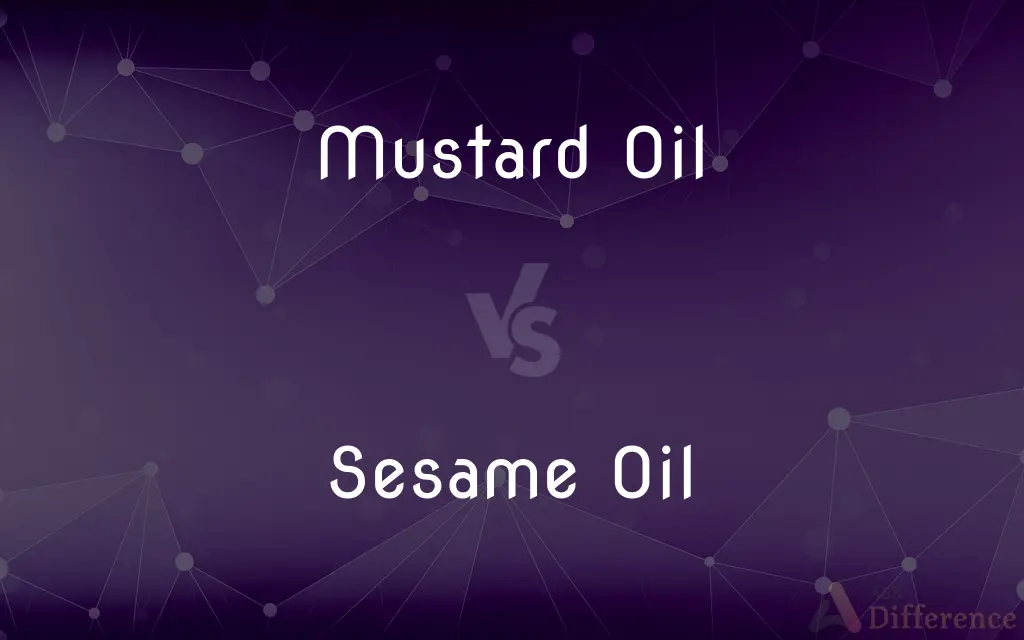Mustard Oil vs. Sesame Oil — What's the Difference?
By Tayyaba Rehman — Published on November 30, 2023
Mustard Oil is extracted from mustard seeds and has a pungent aroma, while Sesame Oil is derived from sesame seeds and boasts a nutty flavor. Both oils are used in cooking and have distinct health benefits.

Difference Between Mustard Oil and Sesame Oil
Table of Contents
ADVERTISEMENT
Key Differences
Mustard Oil is an oil that's extracted from the seeds of the mustard plant. Rich in monounsaturated and polyunsaturated fats, it's a staple in many Asian cuisines, especially in India and Bangladesh. The distinctive pungent aroma of Mustard Oil is due to the presence of allyl isothiocyanate, a compound that gives it its unique taste and smell.
Sesame Oil, on the other hand, comes from sesame seeds. With a history dating back to ancient civilizations, Sesame Oil is a key component in various Asian dishes, including those of Chinese, Japanese, and Korean origins. The oil has a pleasant, nutty aroma, which enhances the flavor of the dishes it's used in, making it a favored choice for many chefs.
Beyond culinary uses, both Mustard Oil and Sesame Oil are hailed for their health benefits. While Mustard Oil is known for its anti-inflammatory properties and is often used as a massage oil in traditional medicine, Sesame Oil is celebrated for its antioxidants and its potential in improving heart health.
In terms of cooking, Mustard Oil has a higher smoke point, making it suitable for frying and high-heat cooking. Sesame Oil, especially toasted Sesame Oil, is more commonly used as a finishing oil, drizzled over dishes for flavor rather than as a primary cooking medium.
Conclusively, while both Mustard Oil and Sesame Oil offer unique flavors and health benefits, their origins, taste profiles, and applications in cooking vary considerably. They bring distinct characteristics to the culinary table, enhancing dishes in their own special ways.
ADVERTISEMENT
Comparison Chart
Source
Mustard seeds
Sesame seeds
Flavor/Aroma
Pungent
Nutty
Primary Use
Frying, traditional medicine
Cooking, finishing oil
Health Benefits
Anti-inflammatory properties
Rich in antioxidants, heart health
Cultural Significance
Popular in Indian and Bangladeshi cuisine
Prominent in Chinese, Japanese, and Korean cuisine
Compare with Definitions
Mustard Oil
A pungent oil often used in Asian cuisines.
The aroma of Mustard Oil filled the kitchen as she started frying.
Sesame Oil
A flavorful oil prominent in Asian dishes.
The salad was drizzled with toasted Sesame Oil for added aroma.
Mustard Oil
An oil with anti-inflammatory properties.
Some people use Mustard Oil for massages to relieve muscle pain.
Sesame Oil
Oil extracted from sesame seeds.
Sesame Oil gives a nutty touch to stir-fried vegetables.
Mustard Oil
An oil derived from mustard seeds.
Many Indian dishes use Mustard Oil for its distinctive flavor.
Sesame Oil
Rich in antioxidants and known to promote heart health.
Many dietitians recommend incorporating Sesame Oil into a balanced diet.
Mustard Oil
A rich source of monounsaturated and polyunsaturated fats.
Health enthusiasts often praise Mustard Oil for its fatty acid content.
Sesame Oil
Often used as a finishing oil in cooking.
The soup was garnished with a splash of Sesame Oil before serving.
Mustard Oil
A cooking oil with a high smoke point.
Mustard Oil is ideal for frying due to its resilience to high heat.
Sesame Oil
A staple in traditional and modern cuisines alike.
From ancient recipes to contemporary dishes, Sesame Oil has remained a favorite choice.
Common Curiosities
Are there health benefits associated with Mustard Oil?
Yes, Mustard Oil is known for its anti-inflammatory properties and is rich in monounsaturated and polyunsaturated fats.
How does the flavor of Sesame Oil differ from Mustard Oil?
Sesame Oil has a nutty flavor, while Mustard Oil is more pungent.
When is Sesame Oil typically added to dishes?
Sesame Oil, especially toasted Sesame Oil, is often used as a finishing oil, added to dishes towards the end for flavor.
What is Mustard Oil primarily made from?
Mustard Oil is extracted from mustard seeds.
Is Mustard Oil suitable for high-heat cooking?
Yes, Mustard Oil has a higher smoke point making it suitable for frying and high-heat cooking.
How is toasted Sesame Oil different from regular Sesame Oil?
Toasted Sesame Oil is made from toasted sesame seeds, giving it a deeper, more pronounced nutty flavor compared to regular Sesame Oil.
What gives Sesame Oil its characteristic nutty flavor?
The flavor comes directly from the sesame seeds it's extracted from.
Are there any skincare benefits to Sesame Oil?
Yes, Sesame Oil is often used in skincare for its moisturizing properties and its ability to improve skin elasticity.
Why is Sesame Oil considered heart-healthy?
Sesame Oil is rich in antioxidants and has components that can support heart health.
Can Mustard Oil be used for purposes outside of cooking?
Absolutely, Mustard Oil is often used in traditional medicine, especially for massages to alleviate pains and aches.
Is Mustard Oil popular in any specific cuisines?
Yes, Mustard Oil is a staple in many Asian cuisines, especially in Indian and Bangladeshi dishes.
Is Mustard Oil safe for consumption?
While Mustard Oil is used in many cuisines, it's important to buy food-grade Mustard Oil. In some countries, it's sold for external use only due to its erucic acid content.
Can I substitute Sesame Oil for Mustard Oil in recipes?
While both are oils, their distinct flavors mean they might alter the taste profile of a dish. It's best to use them as intended in recipes.
Why is Mustard Oil sometimes used for pickling?
Its pungent flavor and antimicrobial properties make Mustard Oil popular for pickling in some cultures.
Can I use Mustard Oil and Sesame Oil interchangeably for massages?
Both oils can be used for massages, but they offer different benefits. Mustard Oil is known for its warming and anti-inflammatory properties, while Sesame Oil is nourishing and calming for the skin.
Share Your Discovery

Previous Comparison
Friends vs. Best Friends
Next Comparison
Phosphoric Acid vs. Citric AcidAuthor Spotlight
Written by
Tayyaba RehmanTayyaba Rehman is a distinguished writer, currently serving as a primary contributor to askdifference.com. As a researcher in semantics and etymology, Tayyaba's passion for the complexity of languages and their distinctions has found a perfect home on the platform. Tayyaba delves into the intricacies of language, distinguishing between commonly confused words and phrases, thereby providing clarity for readers worldwide.












































